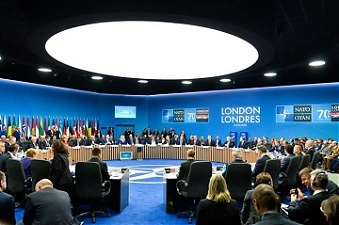EU – Baltic States, Security
International Internet Magazine. Baltic States news & analytics
Saturday, 20.04.2024, 15:16
NATO updates defense plan for Baltics, Poland after Turkey backs down
 Print version
Print versionThe compromise was reached during NATO' summit in Watford, near London, where the Alliance's leaders marked the 70th anniversary of the organization.
"An agreement in principle has been reached. We have no objections on the part of Turkey," Nauseda told reporters after NATO's leaders ended their summit session.
Ankara had refused to sign NATO's updated defense plan for the Baltic countries and Poland until the Alliance agreed on a similar plan for Turkey.
The most contentious issue was Turkey's demand that NATO members designate Kurdish fighters in northern Syria, who helped defeat the Islamic State group, as terrorist groups.
According to Nauseda, the situation of the Kurds was not discussed at the summit.
"It was not on the agenda today," he said when asked about how NATO responded to Turkey's demands regarding the Kurds, "I believe we will solve this issue."
Nauseda described the updated defense plan as a practical implementation of NATO's Article Five on collective defense.
"We can speak about Article Five in abstract terms, of course, but it must have a very specific expression of collective defense that is reflected in plans, reflected in specific investments, and now we will be able to finally take this step," the president said.
"No one demanded anything from us in return for that, and we thanked President Erdogan for his solidarity and the decision (to back the updated defense plan)," he added.
NATO's defense plans for the Baltic states and Poland were first approved in 2010, but Lithuania, Poland, Estonia and Poland want them to be regularly updated.
The defense plans are classified, but Lithuanian officials constantly ask the allies to ensure air defense capabilities and a quicker deployment of forces to the region in a crisis.
Russia`s threat
 |
|---|
Nauseda also welcomed NATO leaders' decision to identify Russia as a threat in the summit's final declaration.
The document says that "Russia's aggressive actions constitute a threat to Euro-Atlantic security".
"When sitting at the negotiating table, I got the impression that many states understand how turbulent the present-day world is and that one of the factors is Russia's aggressive behavior toward its neighbors," the Lithuanian president said.
However, NATO's leaders also said in the declaration that "we remain open for dialogue, and to a constructive relationship with Russia when Russia's actions make that possible".
In the run-up to the NATO summit, sharp discussions on NATO's relations with Moscow were provoked by French President Emmanuel Macron's statements that the Alliance should focus on the fight against terrorism, rather than on Russia's threat.
Nauseda said that during the discussion at NATO, "clearly more nations identified Russia as a threat".
"Yes, some states, even though they do not say that Russia is not a threat, want a more active dialogue with Russia. A certain balance can be found here," the president said.
"Until Russia changes its posture, its aspirations toward neighboring states, its policy towards Ukraine, the dialogue is just smoldering or completely dying away."
"If the situation changes and Russia takes steps that show its goodwill, that dialogue can be very intense, and Lithuania will be one of the initiators of that dialogue," he added.
China's economic expansion was discussed by NATO leaders for the first time at the meeting at a luxury golf club in Watford.
According to Nauseda, particular attention was paid to China's activity in technologies and infrastructure.








 «The Baltic Course» Is Sold and Stays in Business!
«The Baltic Course» Is Sold and Stays in Business!

